In this episode of #coachbetter, Clint and Kim recap some of their favorite moments from this season of the podcast, and share some highlights to come next season. Plus, you’ll hear a little bit about why we structured the season the way we did, what we’re most excited about for next season, and some of the big ideas that are on the forefront of our minds right now. This is our last episode for season 3, so we’ll see you back here with brand new episodes this August! To keep up with all our episodes, subscribe to #coachbetter wherever you get your podcasts! Plus, catch all our blog posts with more details about each episode on our website at coachbetter.tv
Subscribe to #coachbetter via your favorite Podcast Player!
Featured Guests
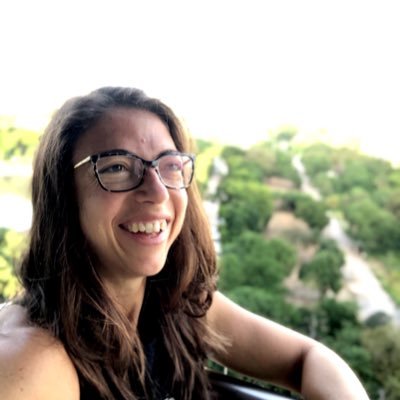
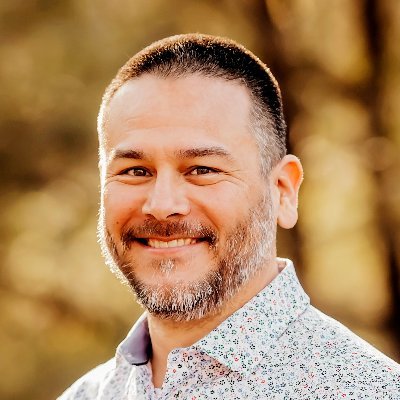
Show Notes
What were the highlights for this season, from your side of the microphone
KIM: We tried to set our episodes according to seasons and the seasons were matching with our certificate program launches.
Early in the academic year, we talked about innovative learning because we were launching that cohort of the COETAIL (Certificate of Educational Technology and Information Literacy).
In the middle of the year, we really focused deeply on coaching and talked to a lot of coaching experts because we’re focusing on the launch of this cohort of The Coach Certificate and Mentorship Program, so that’s going to come out as a major highlight.
Towards the end of the academic year, we talked about leadership with lots of our women leaders who were featured in the Women who Lead Certificate Program because we were launching that certificate. So in my mind have them chunked into three sections.
In that first part of the year, thinking about COETAIL, thinking about innovative practices in classrooms, we had so many great conversations. We spoke to Firoozeh Dumas, who is a New York Times bestselling author. We spoke to Darnell, Liz, and Ceci, who all were part of a MastermindEd that Darnell ran for us called “Culturally Responsive Leadership”, and that was a great reflective conversation on how they’re bringing culturally responsive leadership into their schools. We talked to a bunch of our COETAIL grads. We talked to Cary Hart and Andre DeKoker about designing, implementing innovation spaces. And we talked to Pana Asavavatana about the power of virtual events, and we had a panel conversation about what makes coaching successful and really all of those were great conversations.
One thing that stood out to me was in the Firoozeh episode, we talked a lot about bringing creativity and the joy of creativity to life in our classrooms. It’s been a rough couple of years, maybe creativity and joy is like not something that’s feeling naturally at the forefront of things just because it’s been a rough couple of years. So it was really nice to have a conversation with someone who is actually a creative person. That’s, that’s their business, that’s what they do. They are creative. I’m always reminded about, if you put effort into something, you will be able to build those skills. I don’t often think of myself as a creative person, so I like talking to creative people so I can remember that it’s possible for me to be creative too. I just need to practice and do it with intention.
CLINT: I love that COETAIL kicks off the whole season. I love what that program represents and the amount of people who go through it and the sort of transformation that we hear from people who go through it. It does have a big effect on how you think about your classroom, how you think about teaching and learning and leadership, so I love that that is sort of the kickoff of that kind of mini-season.
Talking about this creativity bit, one of the things in COETAIL that I remember from ages and ages and ages ago, and I was talking to one of my daughters about this, I was talking about Vine. There was an article or a video. One of these Vine creators, like one of the original like pre-Tik Tok creators, and he’s just like, I just made a video every day for 30 days. He’s like, and it’s just amazing how much having that commitment and sticking to it and learning as you go, really that idea that anybody can be creative and anybody can upskill themselves. it’s just having that goal and really being really focused on what you’re trying to accomplish.
That also got me thinking about, Sean Kirkwood, who you can find on Twitter, @shaunyk, he, for a long time was doing this thing called Five Minutes of Fun. And like, I think that’s something that sort of every teacher can bring into their classroom is just like, what’s those quick five minute short little activities just to bring some joy, bring some fun, bring some excitement back into the classroom, because it is hard.
We’ve been online, we’ve been offline, we’ve been hybrid. We’ve been face-to-face, we’re back online, we’re back hybrid. How are you going to build that community and bring all of our students and our teachers back? So it’s exciting to hear all of those highlights coming together and focusing on that. It’s not really what you think about when you think about COETAIL, but I do think it gives us the opportunity to really again re-imagine, or maybe transform what we think is important in our classrooms, particularly in these COVID times.
KIM: It’s having that confidence to be able to take risks and try new things and be intentional about what you’re looking for in taking those risks that COETAIL gives you, that makes it feel like I can do this, and it’s no longer like a worry that something goes wrong. I know I can handle it. That feeling of confidence that’s so important. When you have that feeling of competence and you have that intentionality behind what you do, you can be creative. You can have fun, you can take risks and you can try new things. I think that kind of is a very abstract way to sum up some of the outcomes and COETAIL.
CLINT: When you have that community behind you, that can give you feedback, can support you, give you some ideas, give you praise, challenge you about, you know, what you’ve done, why, and you know, what were the outcomes. That’s a really big aspect of that too. There are COETAIL graduates that you run across either on Twitter or, you know, back in the day when we used to go to conferences face to face, and things like that. But there’s, it would be interesting to see what that diagram of COETAIL’s certificate, participants in graduates look like and how far spread that’s become because I think it really started in Asia, but now it has spread. And as, as you know, they’ve gone, as teachers have gone from Asia to South America, to Europe or vice versa, wherever, you know, the, the COETAIL fingers are, are long.
KIM: During the second mini-season, I talked to lots of coaching experts this year, the stars aligned! I had amazing conversations with Ann Marie Chao, who at the time was at United World College, Southeast Asia in Singapore. I spoke with the authors of the Educoach Survival Guide, in Portland, and that was a super fun conversation. I talked to Diane Sweeney about coaching reluctant teachers. I talked to Joellen Killion – that call was start to finish nonstop gold. I talked to some of the team at Nido de Aguilas in Chile about building a school-based coaching team. I talked to Laura Lipton about the Continuum of Practice for Instructional Coaches. And of course, I talked to our graduates of The Coach Certificate and Mentorship Program to hear about what coaching is like in their schools.
If you’re new to the #coachbetter podcast, or if you’re just starting out in your coaching journey, go back and listen to all of those episodes. That was episodes 140 to 150, any episode in there is seriously a gold mine. They’re all so good. That one with Joellen Killion is episode 146 and that is not to be missed!
CLINT: Instructional coaching has been around for a very, very long time, but, especially in the international school world, we’re seeing more and more schools really putting some weight behind that. Especially again exacerbated by COVID and the fact that we no longer are so easily able to travel and find experts. What we’re doing is we’re building that capacity inside of our schools and we’re bringing sort of that expertise and we’re sharing that expertise amongst ourselves and, really giving people the confidence to use the expertise and the experience that they have.
If you go back and listen to all of those episodes, what you realize is, and this is what I love about this podcast (and talking to so many people in so many different schools around the world), is that even though we have maybe the same goal, how we get there necessarily is different, and there is not one way that’s right, or wrong.
We’ve spoken with Joellen Kilian, Steve Barkley, and Diane Sweeney, all of these experts and published authors who have amazing ideas around coaching. One of them is going to fit better at your school than somewhere else. When you go to a different school, it may be a different model and that’s okay. All of these skills are transferable. All of these experiences just add to your own kind of quiver of arrows that you can pull from as you’re working with other teachers. but just the way in which it is always the same, but always different. I think it’s fascinating. And it makes each one of those conversations interesting and unique, and important.
KIM: I remember back to that Steve Barkley conversation, which was many years ago, and he made a reference that was something along the lines of, “you know, when you’re playing free form jazz, you have to know how to play the instrument first, you have to know something about music first. You’re not just going to pick up an instrument and suddenly be able to like jam with somebody”. I feel like that’s what all these conversations are. It’s like building those bricks of your understanding so that when you move from school to school and the model is different, or you come to a new school and they’re building their model, you have all these things you can pull from.
That’s one of the things I love about The Coach Certificate and Mentorship Program is that we do pull from all these different experts, so you’re not going to get just one point of view on what coaching is, should, or can, be. You’re not going to get just one way to do it because the reality is there isn’t one perfect path for every single school. We’re in our unique contexts, we have our unique communities. There are pieces from all these different programs, all these different models that are going to work in your setting, but knowing and having exposure to all of those is what makes you adaptable and what makes your skills transferable from school to school. You can try only doing one thing one way, I assume you’d be really good at that thing, but it might be really hard to move to a new place or adapt to a new role because you need to be able to see the forest through the trees, or be able to pick up that instrument and play before you can play with others.
Your point about seeing those different perspectives and being able to understand some foundational frameworks that work across all those different models and see how these different things can work in different places. That’s really important. It’s important for international school teachers, coaches, and leaders who move from school to school. It’s also important for educators who stay in the same place because the world is rapidly changing and something that might have worked last year might not work this year. We need to figure out how to adapt to that.
CLINT: You really have to value that flexibility. What wasn’t a challenge yesterday might be a challenge today so having the ability to improvise within reason. A lot of the programs that I’m really interested in are the ones that are really about supporting teachers in their personal growth, in their own capabilities, and not necessarily about ensuring that everybody is doing everything the same thing correctly. In some instances, we need to deliver the same program so we have an expert who’s going to come in and is going to teach us all and ensure that we are all being true to that program. At times you may need to apply that in your school setting. But I think what I love and I’ll speak for you, Kim, I think what you love is that ability of helping teachers realize what their strengths are, where their challenges are helping them set a growth plan, that’s teacher-driven or student-driven or team-driven and not necessarily school directed. I think that’s the really interesting bit. Having that flexibility to help teachers who are in various different journeys and various different folks in various different areas, and feeling like you have the tools and you have the skills and you have the language to help them in all of those.
KIM: That leads really nicely into the third mini-season that we had this past year, which was about Women Who Lead. We focused on leadership and highlighting a lot of the women we interviewed inside the Women Who Lead Certificate Program, but also kind of thinking about coaching as leadership.
For me personally, and looking ahead to where Eduro Learning is going, I really believe that coaching is such a powerful practice. We can get to that innovation, that innovative learning piece through coaching, we can get to leadership through building our coaching skills. So this year I kind of tried to tie in a lot of the coaching skills that are also leadership skills. These are skills you may not even recognize you’re building as a coach, but will absolutely come in handy when you move into, or you consider a leadership, a formal leadership position, maybe even an informal leadership position.
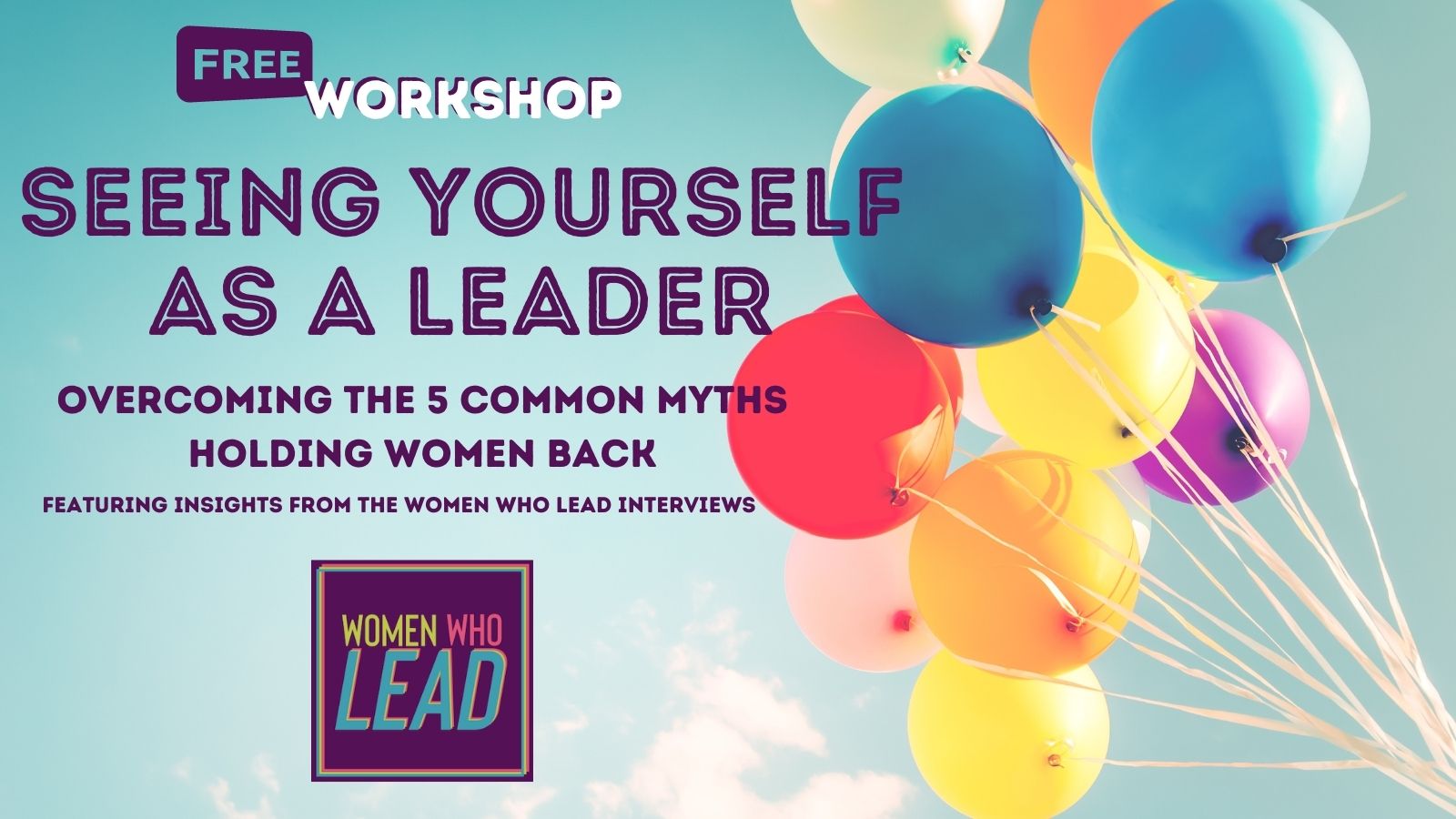
Do you wish you could make a bigger impact in your school setting? Is this the year you commit to your own leadership potential? Or will it be another year you’ll spend saying you’re not ready “yet”?
As an experienced educator, you are likely demonstrating leadership skills every day, by building quality relationships, or managing teams, or having coaching conversations. But if you find it hard to recognize your own leadership capacity, you might be experiencing feelings commonly referred to as “imposter syndrome.”
Many educators, especially women, allow these feelings to keep them from taking the next step in their career. If that sounds like you: stop letting negative self-talk hold you back!
Learn how to crush your imposter syndrome before it gets to you with our new FREE Workshop: Seeing Yourself as a Leader: Overcoming the 5 Common Myths Holding Women Back, available right now!
Inside the workshop, you’ll get a sneak peek into some of the rich conversations inside Women Who Lead, and hear from very successful leaders who still struggle with imposter syndrome – as well as how they’ve learned to handle it. If you can, pause this podcast episode right now and head over to edurolearning.com/leader to register – the workshop is only available for a limited time! But, because I know how busy you are: it’s pre-recorded, so you can watch anytime once you register, and then pause or replay whenever you’re ready.
Don’t let imposter syndrome hold you back this year! Access the workshop now at https://edurolearning.com/leader
Show Notes continued…
For that part of the season, we talked to Kristen Moreland, who at the time that I spoke to her was in Brazil, but now she’s in the US, I talked to Jennifer Abrams about the power of clarifying conversations, I talked to Dr. Chaunté Garrett, who is a superintendent in the US but was formerly an instructional coach (so that was super cool to hear how instructional coaching prepared her for her superintendent position in ways she never could have expected when she got the instructional coaching role and realized was missing from her leadership training). That was maybe a highlight! I spoke to graduates from our Women Who Leads Certificate Program. I spoke to Joellen Kilian, again, along with several other co-authors of many of her coaching books, because they “grew up” professionally together and authored a bunch of books together.
I talked building a student-centered service learning program with Shea Asencio, who at the time was in Luanda, but is now back in Canada.
Two big takeaways that have stuck with me from those conversations. One of them is a conceptual belief, that I now hold near and dear to my heart, is that there are so many coaching skills that will serve you extremely well in a leadership role. If you have any interest in developing your leadership, don’t forget about the coaching skills that are going to go right alongside that. Then the other one was that although we know how to have conversations as adults, we aren’t really trained in the art of having intentional conversations. This is from my conversation with Jennifer Abrams. Starting with a clarifying conversation that can help us have more and more and more successful conversations, whether they’re hard conversations like she talks about in one of her books, or a coaching conversation that you might have with a coachee learning, how to be intentional with the way that you speak and the choices that you make in conversations is something we’re really not taught often as educators. That’s a skill that’s worth learning.
CLINT: If I think back to who were the leaders that I thought were most effective in my career, I don’t think they would say they were coaches, but they definitely exhibit those coaching qualities. They definitely exhibit the empathy and they definitely exhibit the intentionality and the like sort of the open-endedness, and they really focused on me as an individual, or you feel like they’re focused on me as an individual. At that moment, you’re like, you are the only person in the world in the room right there. It’s really interesting how we are kind of coming full circle or bringing that all together. Being validated in these conversations that you were having, with all of these great leaders. If you want to be a leader, wherein the leadership credential are coaching skills? Not every great coach can become a leader, but I think every great leader can be some sort of coach.
KIM: For Women Who Lead, I interviewed over 70 successful women leaders about their experiences on the pathway to leadership and in leadership positions to kind of uncover the realities behind being a female leader, primarily in international schools. But I did also speak with women in public schools and women in consulting or entrepreneurial roles of book authors and that kind of stuff. What I think was really interesting about that is when I asked them, “what are some emerging essential skills for leaders today?” Most of them were skills I have been developing as a coach, that I have found important in my coaching role.
If coaches are really practicing coaching and intentionally working on coaching, they’re building those skills, and although they might not be on a list of “standard leadership skills”, they are becoming more and more essential. This reinforced for me what a powerful practice coaching is and reminded me again, why teachers and professionals of all different kinds should invest in coaching, because it just is an opportunity for the coach to grow their own skills. Obviously, while they’re supporting the person they’re coaching in growing their skills, it’s just so mutually beneficial.
CLINT: I hope that the people who are hiring the next generation of leadership are looking at those coaching skills and hopefully seeing the value. How do we help current leaders recognize the value, and the worth and the potential of people who have these skills and experience as coaches? How do we elevate the value of coaching?
KIM: Articulating your value, articulating your skills, articulating how those practices become leadership or how those practices are leadership or how those practices have demonstrated leadership. That is something that I think is really hard for lots of people, because a lot of those practices, even if there’s something you’re intentionally growing, trying to grow or trying to build, they are practices that come maybe more naturally to you than other things. So thinking about them in that capacity, thinking about those conversational skills, thinking about those empathy skills, thinking about those ways that you plan for conversations, the ways that you interact with others as being leadership skills on the individual side is sometimes I don’t know, unusual or hard for us as coaches. So there’s a whole episode in there in articulating the value of the coaching role, but even almost from your individual person perspective. For example, here’s how I talk about what I have done as a coach and how it naturally leads me to some next step in my career, whether it’s formal leadership or something else, like really recognizing the value in that role and being able to articulate it. That’s a whole episode right there.
CLINT: Focus on the resume building from coach to leadership and ensuring that you’re articulating that language in a way that, that the people who are reading these resumes will go, oh, okay, that’s what we’re looking for—articulated those skills in a way that a superintendent or an HR manager or somebody else would recognize as leadership.
KIM: I think that’s often hard for individual educators, particularly women, to see that those are skills they should highlight. That’s really what we do in Women Who Lead. And it’s often what I do with my private mentoring clients because the people I work with are exceptional. The reason I started the Women Who Lead Certificate Program to begin with is because I was having all these conversations either with women who were doing amazing things and very few of these people looked at themselves as demonstrating leadership.
Especially coaches, especially women, you are developing so many really powerful leadership skills. And for whatever reason, we don’t recognize it in ourselves yet. And so that’s what we do inside Women Who Lead. We help you see that.
That’s also what I do individually with private mentoring clients. I have a special package called Embracing Your Inner Leader. So if this is you, and you’re thinking, that’s me check out the embracing your inner leader, a private mentoring package, and we can work on that together because it’s not easy. You think these skills may come naturally to you and it’s something you may do without even giving it a second thought, but it’s not something the person standing right next to you in the job fair hiring line can do – and how do you stand out for that?
Private Mentoring
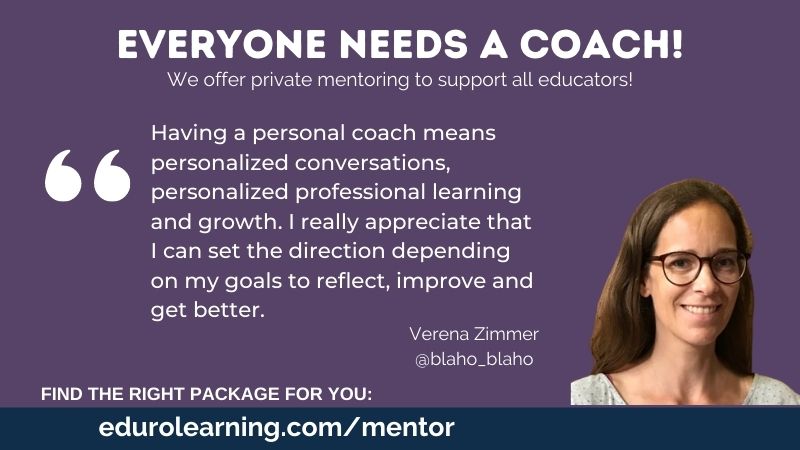
If a reflective positive-minded success oriented conversation is one that you would like to have as part of your professional growth, please head over to a https://edurolearning.com/mentor.
We would love to support you in your professional goals right now, next month, next academic year! If you have a specific goal or a specific challenge or something you really want to develop into as an educator, we can support you. Our private mentoring packages are designed for educators who have specific goals and would like the support of an outside sounding board and coach to help make them happen. You’ll work one-on-one with your mentor as a thought partner, to help mediate your thinking and support you in achieving your unique goals in a timeframe and environment customized just for you.
Find out more: https://edurolearning.com/mentor/
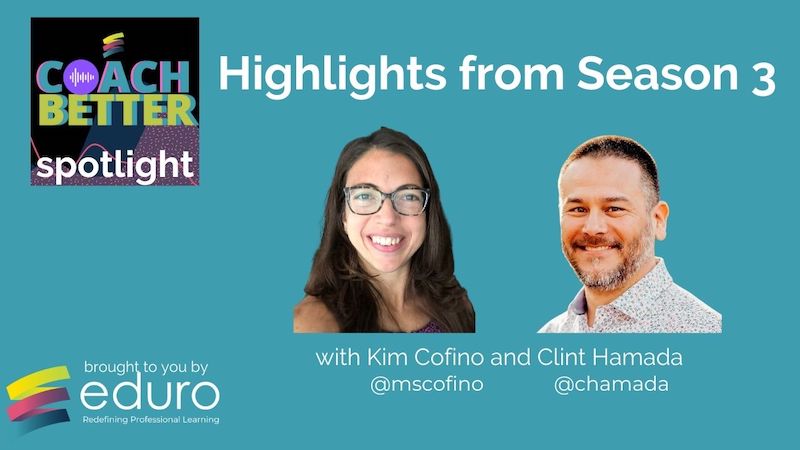




Recent Comments